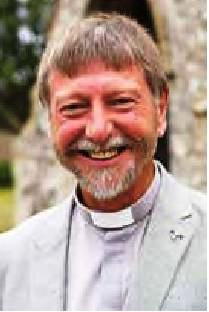|
Opening THE Book 14 with Rev John K-S
 1st July 2019 1st July 2019
as published by St Andrew's Church in the Gorleston Community Magazine
Rev John Kinchin-Smith
Assistant Minister, St Andrew’s Church
Many people consider Handel’s Messiah one of the finest pieces of music ever written. The person of the Messiah is central to both the Old and New Testaments. The Messiah is a kingly person promised by God who will bring God’s reign of peace, righteousness and justice to the earth. The first two prophecies in last month’s article speak about this person
In thinking about the Bible, it’s helpful to remember that the Old Testament, the first 39 books of the Bible, are shared as Holy Scriptures by both followers of the Jewish and Christian faiths. The New Testament (27 books) are Holy Scriptures only to Christians. Jewish believers still await the promised Messiah. Christians believe that Jesus was the Messiah. Indeed, the word Christ is exactly the same as the word Messiah, Christ being Greek and Messiah being Hebrew – both meaning “The Anointed One”. This is why the New Testament often refers to Jesus as Jesus Christ
The first references to the Messiah are found in the Second Book of Samuel which tells the story of King David who lived about 1000BC. (The story of David, the shepherd boy who slays Goliath and who goes on to become King of Israel, establishing Jerusalem as his capital city, is a ‘great read’. It’s both sexy and gory and very human!). David is promised by God that one of his descendants will sit on his throne forever. For this reason the term “Son of David” became a title for the promised and long-awaited Messiah
The Book of Psalms also contains references to this promised King/Messiah, for example Psalm 89. We will consider this wonderful hymnbook of the Bible in more depth later on. Suffice it to say at this point is that these 150 psalms (or hymns) have been a source of comfort, strength and joy to people for almost three thousand years. Psalm 23 is a case in point
“Who exactly is Jesus?” is perhaps the central question of the Bible. The Bible teaches that how one answers this question will determine the whole course of one’s life and one’s eternal destiny. On one occasion Jesus asked his friends, “Who do you say that I am?” His disciple Peter answered “You are the Messiah (the Christ), the Son of the living God” (Matthew chapter 16 verses 13-16)
The views carried here are those of the author, not of Network Yarmouth, and are intended to stimulate constructive and good-natured debate between website users
We welcome your thoughts and comments, posted below, upon the ideas expressed here
Click here to read our forum and comment posting guidelines
|
|
|
|